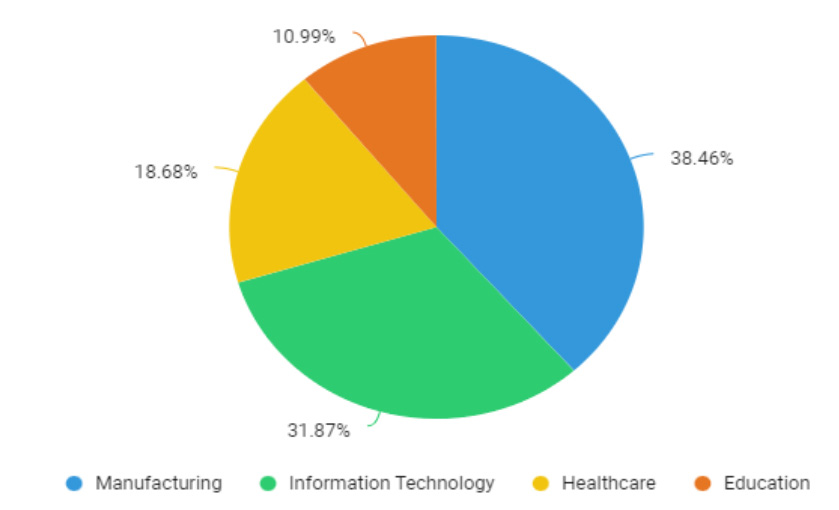In the rapidly changing economy of the present day, businesses worldwide are grappling with an increasing concern: the expanding skill disparity between the workforce's capabilities and the requirements of employers.
Particularly evident in countries like India is this disparity, which the rapid advancement of technology only serves to exacerbate. The education system frequently fails to provide millions of graduates with the practical, hands-on skills that industries require, even though it produces millions of graduates.
What is the solution? Apprenticeship program. Apprenticeships, which were previously perceived as a conventional approach to skill development, are now recognized as a contemporary and viable solution to the expanding market skill divide. We will explore how apprenticeships can address this gap and guarantee that businesses have access to the necessary qualified labor.
Understanding the Market Skill Gap
First, we need to comprehend the market skill gap to appreciate the importance of apprenticeships fully. The difference between the abilities candidates have and the abilities required for a specific position is known as the "skill gap." Many industries report an alarming skills gap that directly affects their production, even in the face of an oversupply of highly skilled graduates.
In 2024, approximately 48% of Indian employers reported experiencing challenges in filling positions as a result of a scarcity of qualified workers, according to a recent report by the Confederation of Indian Industry (CII). Manufacturing (38.46%), information technology (31.87%), and healthcare (18.68%), all of which necessitate specialized training that is frequently absent from the general workforce, are the most significantly impacted industries.
Sector Wise Data for challenges in developing Skilled Workforce

Why Apprenticeships Are Emerging as a Solution
Traditional educational systems frequently fall short of the rapidly changing demands of the marketplace. Employers require practical, real-world skills, while universities emphasize theoretical knowledge. Apprenticeships, which offer helpful, industry-relevant instruction, bridge this gap.
- Tailored Skill Development
Apprenticeships meet employer demands, unlike traditional education. This gives trainees the right skills for the job. An IT company that needs cybersecurity specialists can create a cybersecurity-only apprenticeship program. Employers ensure apprentices are job-ready by tailoring the learning journey to their needs, filling essential skill gaps.
- Cost-Effective Talent Pipeline
High demand for scarce talent makes hiring talented people pricey. Apprenticeship programs help organizations develop talent in-house more cheaply. While training and mentoring the apprentice, the company gains a more capable workforce, reducing the need for expensive recruitment.
How Apprenticeships Solve the Skill Gap for Employers
- Real-World Training, On the Job:
Traditional education paradigms teach theory but not practice. Apprenticeships fill this gap by providing structured training in the real world. Apprentices work with experienced professionals and receive mentorship to prepare for industry careers. Apprentices learn fundamental, in-demand skills and boost productivity from day one with this "learn and earn" strategy. A more skilled and job-ready staff results from the personalized learning curve's faster adaptation to business culture and industry standards. Retention: Apprenticeships typically boost employee loyalty. Apprentices stay longer with their training organizations, according to many studies. This eliminates turnover and builds a stable, seasoned team that grows with the firm. Apprenticeships also offer defined professional paths, making them appealing to long-term career progression seekers.
- Flexibility in Skill Development:
The apprenticeship model's adaptability to nearly any industry or position is its greatest asset. Apprenticeships enable businesses to customize the training process to meet their current and future requirements, regardless of whether they specialize in software development, engineering, healthcare, or finance. This adaptability is essential for industries that are experiencing technological advancements at an accelerated pace. Apprenticeships enable organizations to enhance the skills of their employees continuously, guaranteeing that they are consistent with the most recent industry developments.
- Lower Recruitment Costs:
Employers spend a lot of time and money recruiting and training candidates who may not have the right capabilities. Apprenticeships simplify this. Instead of investing in someone who may or may not have the proper abilities, employers can teach apprentices to their needs. Apprentices have a greater connection to their employers, reducing turnover.
- Improved Retention Rates and Loyalty:
Retention rates are frequently higher in apprenticeships than in traditional recruiting. The likelihood of employees remaining with the organization following the completion of apprenticeship training is higher, as they have dedicated time and effort to developing skills that are unique to the organization. Building a sense of loyalty is a critical issue for many businesses, as it reduces employee turnover.
- Government Support and Financial Incentives:
Governments worldwide are supporting apprenticeships to close the skill gap by offering financial incentives to enterprises that hire them. The National Apprenticeship Promotion Scheme (NAPS) and National Apprenticeship Training Scheme (NATS) in India provide firms with lucrative subsidies and grants for hiring apprentices.
Businesses may navigate these government initiatives with a reliable partner like 2COMS, assuring compliance and maximizing benefits. 2COMS, a renowned third-party administrator (TPA), simplifies NAPS and NATS implementation so enterprises can take advantage of these benefits without administrative hassles.
The Role of 2COMS in Apprenticeship Implementation
2COMS is a leader in apprenticeship program implementation across sectors. We offer complete apprenticeship solutions, from recruitment and onboarding to training and compliance. We have extensive experience managing labor regulations and government programs after 30 years.
Apprenticeships in the Future: 2024 and Beyond
In India, the trend towards apprenticeships is poised to experience exponential growth. Per the India Skills Report 2024, the need for apprenticeships is projected to increase by 30% during the next five years. Furthermore, the research indicates that 85% of Indian businesses currently consider apprenticeships to be the most efficient method for closing the skill disparity, which is a significant rise from just 40% in 2020.
Moreover, apprenticeships are undergoing evolution. Contemporary apprenticeship programs increasingly encompass sophisticated positions in the developing fields of artificial intelligence, blockchain, and sustainable energy technology. As automation and technology integration become increasingly prevalent in the future of work, the apprenticeship model will continue to evolve to ensure that firms have access to highly qualified personnel who are prepared to tackle future difficulties.
Conclusion: Apprenticeships—The Way Forward
In summary, employers from various sectors are currently grappling with the urgent issue of the skills divide. Apprenticeships provide a viable, cost-effective, and scalable remedy to this issue. Apprenticeships not only bridge the skill divide but also advocate for diversity, inclusion, and loyalty within the workforce by enabling businesses to train candidates in the precise skills they need.
Apprenticeship programs should be considered a long-term strategy for workforce development rather than a temporary solution. Companies that implement this model will not only be capable of addressing their existing talent shortages, but they will also be better equipped to adjust to future market changes. Apprenticeships are expected to become more critical in the development of the workforce of the future as the market continues to evolve.
For additional information, please do not hesitate to contact us.





























